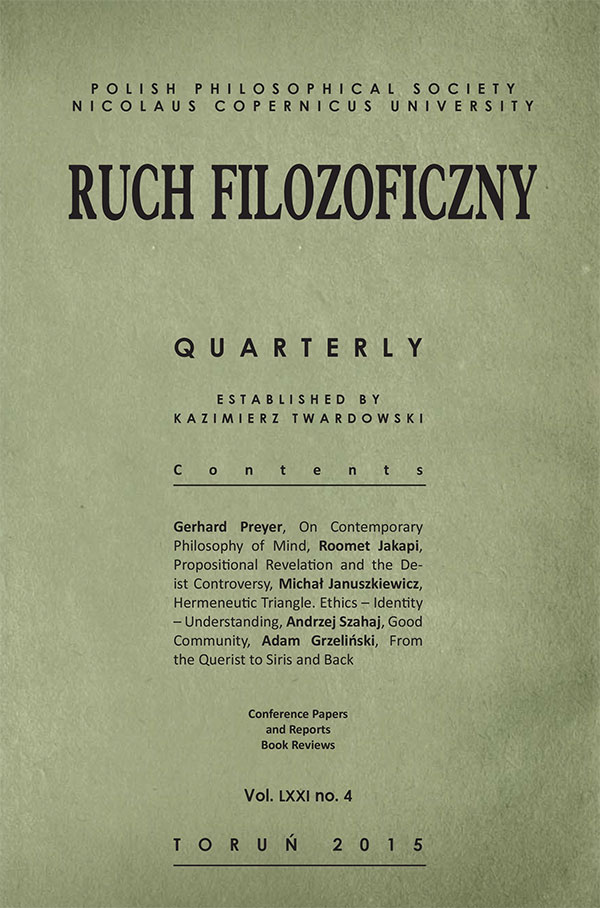The Trouble with Ressentiment
DOI:
https://doi.org/10.12775/RF.2015.006Keywords
Nietzsche, ressentiment, consequences of compensatory transformation of values, touchy issuesAbstract
The article comprises an attempt to interpret the conception of ressentiment created by Friedrich Nietzsche. This interpretation concentrates on the analysis of one of the revaluation of values mechanisms, namely their compensatory transformation. The text tries also to demonstrate in what way this mechanism can lead to connecting ressentiment with the phenomena of fundamentalism and fanaticism. The aim of this interpretation of the conception of ressentiment is to sketch the conditions in which ressentiment could entail violence, what was pointed at many times by researchers studying the phenomenon, including the most famous one of them – Roger Scruton (who sees it as one of the causes of terrorism). The interpretation of the conception of ressentiment present in the paper refers not only to philosophical analyses of this phenomenon but also to the research of the socio-psychologists and sociologists, which is essential for this issue. Therefore, in the context of the research on ressentiment the proposed interpretation addresses the problems of the methodological-axiological nature, which are connected with obtaining knowledge on sensitive subjects. The problem of ressentiment is one of such issues.
References
Bilewicz, M. Być gorszymi. O reakcjach na zagrożenie statusu grupy własnej. Warszawa: Wydawnictwo Uniwersytetu Warszawskiego, 2008.
Brown, D. and I. D. Wilson “Ethnicized Violence in Indonesia: Where Criminals and Fanatics Meet”, Nationalism and Ethnic Politics 13 (2007).
Dein, S. „What Really Happens When Prophecy Fails: The Case of Lubavitch”, Sociology of Religion 62, 3 (2001).
Epstein, S. „Cognitive-Experiential Self-Theory: An Integrative Theory of Personality”, in: R. C. Curtis (ed.), The Relational Self: Theoretical Convergence
in Psychoanalysis and Social Psychology. New York: Guilford Press, 1991.
Festinger, L., H. W. Riecken and S. Schachter When Prophecy Fails. London, Pinter & Martin 2008.
Gergen, K.J. Nasycone Ja. Warszawa: Wydawnictwo Naukowe PWN, 2009.
Johnston, I. (ed.) On the Genealogy of Morals, A Polemical Tract by Friedrich Nietzsche. Nanaimo: Vancouver Island University, 2009.
Kaplan, H. B. Deviant Behavior in Defense of Self. New York: Academic Press, 1980.
Langman, L. and D. Morris „Islamic Terrorism: From Retrenchment to Ressentiment and Beyond”, in: H. Kushner (ed.), Essential Readings on Political Terrorism: Analyses of Problems and Prospects for the 21st Century. New York: Richard Altschuler & Associates, 2002.
León, R. D., C. A. Romero, J. Novara and E. Quesada „Una escala para medir el resentimiento”, in: R. D. León and C. A. Romero (eds.), Estudios acerca del resentimiento, Lima: Consejo Nacional de Ciencia y Tecnología, 1990.
Nietzsche, F. Wola mocy. Próba przemiany wszystkich wartości (studia i fragmenty). Warszawa: Jakób Mortkowicz, 1911.
Oz, A. Jak uleczyć fanatyka. Warszawa Prószyński i S-ka, 2002.
Pies, R. „A Simple Way to End Terrorism”, Journal of Mundane Behavior 2 (2001).
Poellner, P. „Self-Deception, Consciousness and Value. The Nietzschean Contribution”, Journal of Consciousness Studies 11, 10-11 (2004).
Salovey, P. and A. J. Rothman „Envy and Jealousy: Self and Society”, in: P. Salovey (ed.), The Psychology of Envy and Jealousy. New York, London: The Guilford Press, 1991.
Scheler, M. Das Ressentiment im Aufbau der Moralen, Frankfurt am Main: Klostermann, 1978.
Scruton, R. „Machina nienawiści. Antropologiczne źródła terroryzmu”, Europa („Idee”), 6 X 2004.
Steele, C. M. „The Psychology of Self-Affirmation. Sustaining the Integrity of the Self”, in: L. Berkowitz (ed.), Advances in Experimental Social Psychology. Vol. 21, New York: Academic Press, 1988.
Stone, J. R. “Prophecy and Dissonance: A Reassessment of Research Testing the Festinger Theory”, Nova Religio: The Journal of Alternative and Emergent Religions 12, 4 (2009).
Tesser, A. “Toward a Self-Evaluation Maintenance Model of Social Behavior”, in: L. Berkowitz (ed.), Advances in Experimental Social Psychology. Vol. 21, New York: Academic Press, 1988.
Downloads
Published
How to Cite
Issue
Section
Stats
Number of views and downloads: 607
Number of citations: 0



